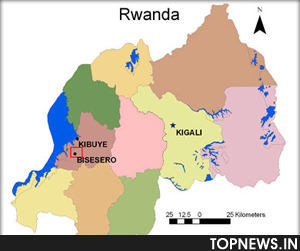15 years after genocide, shadows remain over Rwanda progress
Kigali - In the western Rwandan town of Gisenye, near the border with the Democratic Republic of Congo, a small platform sits on the scenic Lake Kivu, barely visible from the shores of the burgeoning resort town.
A long tube runs out of the bottom of the platform, extracting the methane gas that saturates the water of the lake.
 The gas is pumped to shore and converted to electricity in a newly constructed facility, which is then shipped to a country that only has six per cent of its inhabitants on its national grid.
The gas is pumped to shore and converted to electricity in a newly constructed facility, which is then shipped to a country that only has six per cent of its inhabitants on its national grid.
The project, government sources say, holds the potential to support a 700 megawatt power plant for 50 years.
Officials point to the Lake Kivu Power Project, which began producing electricity in May, as a symbol of the regeneration of the Rwandan state after the devastation caused by the 1994 genocide.
"This is a key project for the country," Dr Albert Butare, Rwanda's minister in charge of energy and water, says. "It holds the potential to revolutionize our economy."
The government hopes to provide electricity to 35 per cent of Rwandans within a decade, facilitating the growth of a prosperous middle class.
As the country prepares to mark the fifteenth anniversary of the genocide, it is barely reminiscent of the images the world saw in the aftermath of the genocide, where up to 800,000 Tutsis and moderate Hutus were killed in 100 days of violence.
In the streets of the capital Kigali, young, smartly dressed people walk around carrying laptops. Stores and cafes are full. Kigali prides itself as being one of the few African cities where visitors can walk around after dark.
Rwanda's parliament has the highest percentage of women representatives in the world and has regained its status as an attractive region for development.
The country has been praised by many for its progressive economic policies and its intolerance for the corruption that is endemic in many of its neighbouring states.
Government officials and police officers caught soliciting bribes are publicly shamed and immediately prosecuted.
The World Bank praised Rwanda in its 2009 Doing Business Report, which tracks global business regulations, noting that the country rose dramatically in its ranking by implementing reforms to its taxation and land management policies.
"Rwanda has made remarkable progress since the 1994 genocide and civil war," the report read. "Peace and political stability have been re-established, reconciliation efforts are continuing, and democratic institutions and processes are being strengthened."
But behind the praise and symbols of progress lies a darker reality.
The respected Economist magazine classified Rwanda as an "authoritarian state" in its annual report on the state of the world's democracies.
In its 2008 Human Development Index, which tracks quality of life in countries around the world, the United Nations Development Programme ranked Rwanda 165th of 179 countries, placing it in the global basement for life expectancy, education, literacy rates and annual income.
President Paul Kagame has also repeatedly come under fire for bypassing democratic principles.
Since he came to power in March 2000 - following a post-genocide period as prime minister - his government has won two landslide elections, largely because opposition parties are banned from the political process.
The global media watchdog group Reporters Without Borders has criticized the Kagame regime for its intolerance towards an independent press, regularly including the president on its annual list of "predators of press freedom" alongside dictators like Zimbabwe's Robert Mugabe.
In December, Kagame's government was stung by UN allegations that his government was profiting from the war in neighbouring Democratic Republic of Congo and was supporting rebel leader Laurent Nkunda, who has been accused of war crimes.
The Rwandan government angrily denied the charges but was reportedly embarrassed in December when Sweden and the Netherlands suspended 18.7 million dollars in budget support payments to protest Rwanda's role in the DR Congo.
In January, the Rwandan army crossed the border, arrested Nkunda and joined up with the Congolese army to fight Rwandan Hutu militia.
Supporters of the government claimed that the actions vindicated Rwanda in the eyes of the world.
Whether that is true or not, Kagame appeared to have been miffed by the external pressure, and has since intensified his argument that nations dependent on foreign dollars need to break ties with the donor culture.
"Aid can not be a long term substitute for investment and economic growth," he said during a recent visit to South Africa. (dpa)